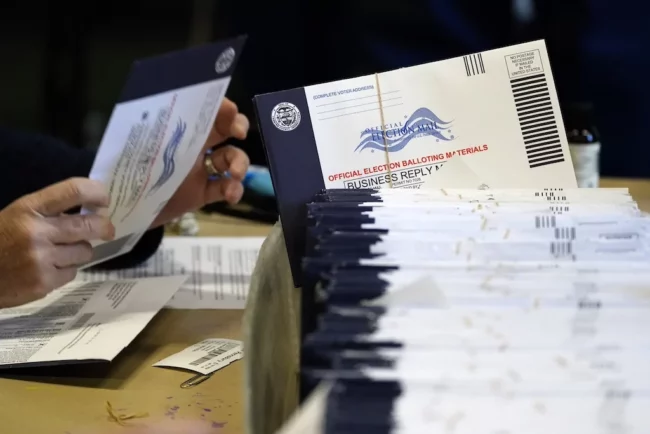
Republicans have launched legal challenges in three battleground states over the past several weeks targeting the rules that govern ballots cast by U.S. citizens living overseas, including military personnel.
The lawsuits, filed in Michigan, North Carolina, and Pennsylvania, argue that current overseas voting regulations are vulnerable to election fraud, claims supported by former President Donald Trump and his allies. The challenges coincide with allegations raised about noncitizens voting by Trump and supporters such as Tesla founder Elon Musk.

The lawsuits take aim at the Uniformed and Overseas Citizens Absentee Voting Act, which critics say has been abused to allow people to register to vote online without providing valid identification, a Social Security number, or proof of citizenship and address.
Musk amplified his concerns in a post on X, asking in an Oct. 4 post, “Is this for real?”
Is this for real? https://t.co/S4WqdUXaGW
— Elon Musk (@elonmusk) October 4, 2024
Trump posted on Truth Social two days later in response to a thread elevating these concerns from Joel Berry, editor of the satirical news website the Babylon Bee, calling on Republican National Committee lawyers to “STOP THIS FRAUD, NOW!!!”
Shortly after, the RNC initiated lawsuits on Tuesday in North Carolina and Michigan state courts, accusing officials of unlawfully using UOCAVA to extend voting eligibility to people whose residency in those states has not been verified.
The crux of the argument surrounds both states’ constitutions, which forbid anyone from voting in those states if they have never resided there. And the federal UOCAVA does not make any explicit exemptions that would override those state constitutions.
In essence, Trump and other critics fear that the overseas ballots would be wrongly counted as votes that originated from those swing states, with no clear indication that the overseas voters actually have ties to the specific states.
“North Carolinians and Michiganders should not have their votes canceled by those who’ve never lived in the state in the first place — plain and simple,” RNC Chairman Michael Watley said. “This is illegal and we will stop it. While Democrats want an election system that disregards the law, we are committed to election integrity across the country.”
What’s going on in the Pennsylvania dispute?
The federal lawsuit in Pennsylvania, filed by six Republican members of Congress on Sept. 30, claims that the state’s overseas ballots are at risk of fraud due to the absence of voter ID requirements for these voters.
The Pennsylvania suit, which was amended on Monday, specifically targets Pennsylvania Republican Secretary of the Commonwealth Al Schmidt and Deputy Secretary for Election Jonathan Marks, alleging that the officials are complicit with overseas voters to bypass ID requirements under UOCAVA.

“Essentially, the Defendants through directives and guidance to county election officials exempt UOCAVA applicants entirely from verification of identity and eligibility as required under state law and federal law,” the GOP lawmakers alleged in their amended complaint.
U.S. District Judge Chris Conner for the Middle District of Pennsylvania, an appointee of former President George W. Bush, agreed on Thursday to allow the Democratic National Committee to intervene in the lawsuit.
Both Marks and Schmidt have moved to dismiss the lawsuit. Conner has scheduled a hearing on the lawmakers’ request for a preliminary injunction on Friday, just under three weeks until Election Day in the race between Trump and Vice President Kamala Harris.
The arguments raised by Pennsylvania lawmakers were similar to those the RNC made in the state court suits against election officials in North Carolina and Michigan, with GOP challengers contending that the states’ rules go beyond what is mandated by the UOCAVA.
Election officials say the lawsuits aim to sow confusion
Election officials in the affected states and nonpartisan experts have defended their decision to leave in place these less restrictive overseas voting rules, which for years were more supported by Republicans because overseas military voters had long been considered GOP supporters.
But fears of misuse of UOCAVA and changes in the GOP’s makeup, especially since Trump elevated voter fraud concerns in the 2020 election, have, in part, prompted the challenges.

Meanwhile, state officials in charge of handling the elections argue that the legal challenges are part of an effort to preemptively question the legitimacy of the 2024 election.
Patrick Gannon, spokesman for North Carolina’s State Board of Elections, said the state’s overseas voting laws have been in place for over a decade and are designed to comply with federal mandates.
Gannon contends that the lawsuit in his state will fail because it was filed “after voting had already begun in North Carolina for the general election” and that votes have already been cast.
The Michigan Department of State labeled the lawsuit as a strategy by the RNC to undermine trust in elections, while the Pennsylvania Department of State press secretary called the suit “nothing more than an attempt to confuse and frighten people ahead of an important election.”
Why these overseas election rule cases matter
Trump lost to then-candidate Joe Biden in 2020 by just under 2% of the vote in Pennsylvania, and the battleground state is predicted to be just as close this time around in the race between the former president and Harris.
Trump lost to Biden by just under 3 points in Michigan and beat out his successor by just under 1 point in North Carolina.
CLICK HERE TO READ MORE FROM THE WASHINGTON EXAMINER
As of Friday, a combination of 76 polls indicates that Harris has a narrow lead over Trump in Pennsylvania, around 0.6 points.
Pennsylvania has sent out 25,000 ballots to Americans abroad so far this year, according to data from Schmidt’s office, an amount large enough to be a decisive bloc in the election.






